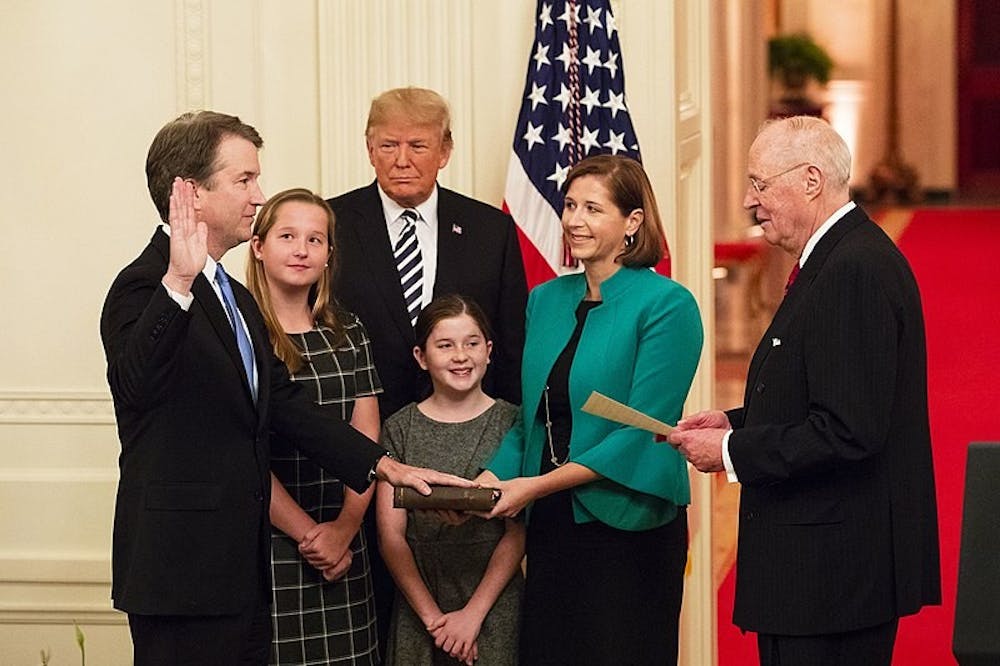On Sept. 27, Dr. Christine Blasey Ford testified against Supreme Court nominee Brett Kavanaugh, accusing him of sexual assault 36 years ago. On Oct. 6, however, Kavanaugh was confirmed to the highest court in the land by the Senate by a vote of 50-48. While the prevalence of the #MeToo movement and incidents of sexual assault and harassment being uncovered by the press give the illusion that we have made progress on these issues, these recent events are reminiscent of another woman’s struggle back in 1991 — Anita Hill.
Nearly 30 years ago, then nominee Clarence Thomas was accused of directing unwanted advances and inappropriate comments towards Hill. Thomas was accused of discussing pornographic films where women were portrayed having group sex or acting out rape scenes. She testified, “It is only after a great deal of agonizing consideration and a number of sleepless nights that I am able to talk of these unpleasant matters to anyone but my close friends.”
Thomas vigorously denied the allegations, and immediately took back the spotlight replying, “from my standpoint as a black American, as far as I’m concerned, it is a high-tech lynching.”
Many Americans agreed with Thomas’s characterization. A CBS News/New York Time poll collected before Hill’s testimony gathered that only 21 percent of respondents believed Hill and 47 percent thought the allegations were untrue. These hearings lasted three days and concluded with Thomas confirmed by a narrow vote of 52-48, guaranteeing his position to the U.S. Supreme Court.
These accusations and subsequent hearings were revolutionary in 1991 because sexual harassment was not openly discussed often. Thomas’ confirmation hearings brought the issue to the forefront of many Americans’ minds.
As a result, 1992 was coined the “year of the woman.” Previously, there was a lack of women in government, but the coverage of the hearing forced citizens to talk about the absence of women’s voices in the political sphere. In 1992, women went to the polls and ran for public office in record-breaking numbers and resulted in 24 women winning seats in the U.S. House of Representatives, and the Senate had triple the number of women in the chamber.
While these gains were impressive and many were optimistic about the strides that would be made with these issues, recent events show how little has changed. Just as with Hill, despite Ford’s allegations, Kavanaugh was still confirmed and has become a member of the highest court in the land. This reality points to the unfortunate truth that many women must endure — we still have a long way to go in our country.
Society needs to change its approach towards handling incidents of sexual assault and how survivors who share their experiences are treated. Superficial arguments such as stating that the victim just wants revenge or money or the common questioning of “why are you coming out now?” are just a few examples of the treatment many survivors have to endure. These arguments for why women or men share their personal narratives of sexual harassment are posed in hopes of derailing the issue and delegitimizing the experiences of those who bravely come forward to tell their stories. This kind of questioning is trivial and is still being used today to impede progress on addressing sexual assault and harassment. This issue cannot be partisan, we must put a stop to this never-ending cycle of victim blaming.
What we should be particularly focused on right now is not just how Kavanaugh’s confirmation to the Supreme Court will affect this year’s midterm elections but what his confirmation means for women in America and survivors of sexual assault. American society should not simply acknowledge incidents of sexual harassment and move on — as a result, elected officials and citizens must take a direct course of action. However, we must hold our leaders accountable for making the changes we want to see in this controversy. Sexual harassment cannot remain unaddressed as it still haunts the lives of so many women and men. Survivors have shed light on this systemic issue in our society, and the job remains for citizens to hear their stories and help fight against it.
Elizabeth Aramayo is a Viewpoint Writer for The Cavalier Daily. She can be reached at opinion@cavalierdaily.com.





